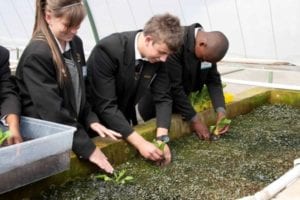For Air Products South Africa, corporate social investment (CSI) is about taking responsibility for the future, which means caring for today’s children and youth. This is why the company has chosen to invest its time and resources in education-related programmes, in a bid to encourage hope and self-reliance among South Africa’s economically-disadvantaged youth.
The company initiated its sponsorship of a project in partnership with Inmed South Africa, which aims to address the scourge of poverty and hunger in South Africa’s rural communities, with a strong emphasis on sustainability and community involvement. Inmed’s Partnership for Children is an international organisation which is transforming the future of hundreds of thousands of children and their families through focusing on health, the development of skills and fostering community collaboration. Inmed South Africa is a fully registered South African non-profit organisation. Working in collaboration with a wide range of corporate, foundation and government partners since 2006, Inmed South Africa is targeting the country’s most vulnerable children and youth. One of its latest programmes is the development of Aquaponics, an innovative food production system which successfully addresses challenges such as poor soil conditions and space issues in economically disadvantaged areas, as well as wider-reaching concerns such as water scarcity. Inmed, in recognising Air Products’ commitment to positively impacting the lives of children,approached the company to become involved in its Aquaponics programme in this country. “Air Products is the first company in South Africa that we have worked with which really recognises the potential of aquaponics to change people’s lives and break the cycle of poverty,” says Dr Linda Pfeiffer, CEO and President of Inmed. Aquaponics is an intensive food production technique which combines aquaculture (fish farming) and hydroponics (soilless crop growing). It works on a closed system whereby the nutrients from fish tanks feed gravel grow beds, which also act as a filter for the fish water which is then pumped back into the tanks, cleaned and oxygenated. In this cyclical and synergistic manner, the fish tanks and gravel plant areas ‘feed’ each other, resulting in on-going plant and protein production with very little impact on the environment. “The simple ebb and flow system eliminates the need for expensive filters and oxygenator systems. The Inmed Aquaponics systems are built on a modular design which can be adapted to fit available space, from individual family units to commercial systems of various sizes,” explains Dr Pfeiffer.“Projects which focus on children’s health and development are very close to our heart,” says Josua le Roux, General Manager – Central Support at Air Products South Africa.
“When Inmed South Africa approached us to help with the aquaponics project, it immediately struck a chord, because at the core of the project are knowledge-sharing and building self-reliance. The development of sustainable food systems in both urban and rural environments is becoming a major challenge, made more serious in the face of declining water resources,” le Roux says. “The Inmed aquaponics system is about bringing this innovative technology to the grassroots level, and we are very excited to be a part of it,” he adds. Inmed and Air Products together selected the Carel De Wet Technical High School in Vanderbijlpark for the site of the latest aquaponics unit. The school, which offers agriculture as a subject, has its own agricultural plot which is used to teach the children – who mostly come from economically disadvantaged backgrounds – how to grow food in a sustainable and environmentally-friendly manner. “There is great potential for aquaponics in this country, and this project will teach our children not only how it works, and how to grow their own food – but also how to produce food on a larger scale as a commercial venture for the school,” says Gawie Richter, Principal of Carel de Wet Technical High School. The aquaponics project can potentially produce 2 000 kg of fish, which can result in 26 000 kg of vegetables being grown and produced annually, making the project commercially viable, year-round. “The system, which is currently the largest which Inmed has undertaken in South Africa,has a built-in greenhouse to ensure consistent fish and vegetable production through the cold season. The fact that it uses tunnels means that aquaponics is not vulnerable to weather factors and climate change, which adds to its long-term viability,” says Dr Pfeiffer. “The work Inmed South Africa does is very much in line with our corporate social investment (CSI) focus on education and the development of children. Not only is the potential there to eradicate hunger, but aquaponics can teach whole communities about self-reliance, whileconserving and sustaining the earth’s resources. We are hoping this project will inspire and train a whole new generation of farmers,” concludes le Roux.






